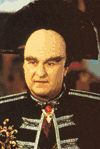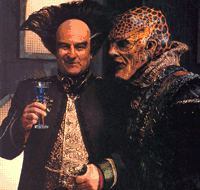  | ||||
HOME |
Peter Jurasik, [Transcribed by Karen Bennett.] [Question from the audience] Which hair did you prefer—the pilot episode, or the hair you got later?
Stephen Furst: It was very funny, because we were told that the higher the hair, the more status you were supposed to have as a Centauri. Jurasik: My agent negotiated that for me—that no hair would be bigger than my hair. I had a question for Bob. How different is it filming a once-a-week TV series versus filming a once-a-day soap opera? [Bob Krimmer plays the part of Rev. Andrew Carpenter in the daytime soap One Life to Live.] Bob Krimmer: If you're working every day on the soap, I think they'd both be equally rigorous. Generally speaking, though, in soap opera you don't work every day. You'll have a story line where you're working very heavily, but then you'll have long periods where youíre not. Interestingly enough, on Babylon they had a similar situation. Sometimes you'd be working really hard in an episode and sometimes you might not be that heavy. So they had some time off too. But my experience on night-time generally, if you're part of an ensemble, is that night-time is a little more rigorous. You get there about 6 in the morning and you may not finish till 6 or 7 at night. It's five days a week. But you do get that 22-week hiatus that you don't get on a soap. I think night-time drama is the most difficult. Sitcoms are the easiest. Jurasik: What's interesting about what Bob was saying is that on any night-time show, sometimes you would be in eight episodes and then there would be long periods where you didn't work at all. Babylon was interesting that way. In the—was it the third or fourth season where you did Cartagia?
Jurasik: Fourth season was interesting in the sense that Joe decided that the first seven episodes were going to be all Cartagia. We did those all in a row. Then we stopped, and you obviously weren't in any more because we had killed you. I wasn't in the next seven or eight, but neither were you, right? Krimmer: Right. I remember you telling me that. We ran into each other or I gave you a telephone call and you said, "Yeah, I'm home with my family." Jurasik: Yeah, it happened to coincide exactly with when my son was born. We finished October 28th and my son was born November 1st. I had about two months off. Krimmer: Paternity leave. The alien creatures on Babylon 5 are show-stealers. When you guys come on, it's like the whole screen lights up. One of my favourite scenes is out of the first season, and thatís when they were having the exchanges of religions on Babylon 5 ["The Parliament of Dreams"]. My favourite is the Centauri banquet scene, where Londo gets up on the table and talks about the different statues. When I'm watching it, I'm wondering, was it written by JMS that, "This is when Londo picks up a statue and kisses her ass," or is the director just saying, "Go, Peter; just go"? Jurasik: He said, "Go, Peter; just go." You remember that, Stephen. I forget what the director's name was, but he basically said, "We only have one take to do this, so donít hang back." Kissing the ass of the statue seemed like a good thing to do at the time. I was sitting next to him [Stephen], and he was being completely outrageous. Claudia was on the other side, and she's just pure energy. That was easy to go for. Furst: I don't remember the director because I don't usually remember directors unless they're me. Jurasik: I knew he was going for that joke when he started it. Of the women Londo was married to, which was really his favourite? Jurasik: You mean between Pestilence, Famine and Death? I prefer Death. I think he said it. Their relationship was good because because they were 70-something-thousand light-years away from each other. So he was happy to be apart. Which lady did you like best, working with? Jurasik: Of those three ladies? I knew Jane Carr [Timov]. I had worked on a show called Dear John and she was on that show. She was very kind to me and sheís a really nice lady, so I liked her best. As it turned out, that's who Londo liked best, too. She was Death. As a followup to the earlier question about time off, on the Star Trek shows, with characters who aren't really a part of the episode, they'll do one little scene with a character for the residual. I take it you prefer having the time off to doing one little throwaway scene for the residual? Krimmer: I'll do anything for a residual. Let's make that clear right now. Jurasik: You mean, would I come in as Londo and do a little bit for— Yes. Jurasik: Whether I was in an episode or not, I got paid for it. It was a good deal. Krimmer: On the soap I can come in and actually have no lines. I've had times I've had to come in and just be there and look concerned. I love those days. There's only one thing better on a soap, and that's to get a six-month story line where youíre in a coma. Jurasik: The truth is, I don't think they want actors around to be extras. You can ask people like Steve, who's a director, but it's just a pain to have too many extra actors. [To Stephen] You wouldnít want me and Andreas as extras in your episode, would you? Furst: I requested you not to be in the episodes you were in! Jurasik: See what I mean? Furst: You donít want 'em around 'cause all theyíre gonna do is complain. Krimmer: Bitch and moan, bitch and moan. Furst: Itís true. This question is for all three of you. As you were developing the character, were you happy with the development that the scriptwriters made to you, or did you contribute to the development of the character, and would you have changed things and made them somewhat different? Jurasik: Iím putting out a short book to answer all those questions. You guys want to jump in? Furst: We really had nothing to do with the development of the character at all. It was just written so wonderfully and developed the way it should have been. So we really didn't have that much to say about it. And we didn't want to be fired. Jurasik: I absolutely ditto this answer. When youíve got a good writer—JMS was getting applause and lauds from all over the science-fiction community and everywhere. Far be it from some actor to say to him, "Oh, I think Iím going to change your five-year arc. How about if Londo opens a dry-cleaning store?" As far as being happy, it's really not for us to make decisions about that. As an actor, I will tell you that you really don't want to make any judgments, particularly about your character. Otherwise that's going to get you in a lot of trouble in terms of playing it. If you decide, "Oh, I'm really unhappy where the character's going," it's going to play bad for you. You try to make positive choices all along the way. Krimmer: I agree with everything they both said. Jurasik: Sounds like heís on his way to the airport, doesnít it? This question's for all three of you. Bearing in mind your individual story arcs and how some of them interrelated with each other, were there any particular other characters that you wish Joe had written that you had more interaction with? Jurasik: That's definitely true for me. I always wanted to work with Claudia, and I don't think I said two lines to her. I worked with Bruce a little bit. Once in a while I had a scene with Mira, but I had very little with her. I would tell him [JMS] that, but he didn't care. He had a story line for me to do, and basically I was stuck with Stephen. Furst: I would've loved to have worked more with G'Kar, but I didn't. I had one scene where I was in the Zocalo at the bar with Bill Mumy— Jurasik: That was a great scene. Furst: We complained about the jobs of being the assistants, and how we were under-appreciated. I really liked that scene, and I didn't get to work with Bill too much. I did a scene with him when I was directing where he was showing some people around and he was being hit in the head by a portable camera, and I just loved that too. I really enjoyed Billy. Krimmer: I agree with everything they said. Jurasik: [To Stephen] That relationship between you and Bill would have been a great relationship to explore more, and I think it occurred to JMS occasionally where he would think, "Gee, it would be great to follow that up." I had an episode with Lennier too that was a fun episode. It just wasn't possible to play it all out. I know Andreas and I suggested to him seriously that in one episode I would play a Narn and he would play a Centauri and there would be some story line, but [JMS] said, "I donít have time for it." One of the things that made Londo such a memorable character was the wonderful accent you invented, and I was wondering if you could tell us a little bit about how you made it up. Jurasik: The real quick story is, I was doing a play in downtown Los Angeles and I got a terrible review for a Tennessee Williams accent, a Memphis Southern accent that I was doing. At that time I got the script for Babylon 5, "The Gathering," and I realized in the creation of the character that I was the first Centauri and I could make him talk any way I wanted— Krimmer: You could use that very same Memphis accent. Jurasik: If I wanted to, I could; that's right. I realized that no-one could ever say to me, "Oh, that's not what a Centauri sounds like," because I was the first Centauri. So I could make him talk any way I wanted. So I used my grandmother from Czechoslovakia; I used an actor on Clockwork Orange; an Irish guy—I spent a lot of time in Ireland, for a couple of summers. In terms of rhythms and accents for the character, that's all. Is there a reason that not many other Centauri use the accent? Jurasik: Who the hell could imitate that accent? Stephen, when you first came on, did you try to do that accent? Furst: I tried to do it, but they said, "No, thank you." I had enough trouble with the hair at that audition I told you about. Jurasik: Bob, you said you tried it. Krimmer: I tried to do it; I couldn't do it. I really couldn't. It just sounded like really bad Bela Lugosi. Jurasik: There was a rhythm to it, a music too, that was forced on it that I think was hard to imitate. Krimmer: Very hard. Except by Larry [Stewart]. This question is for the two gentlemen at the end. Furst: What are you talking about, the end? There are three of us. Jurasik: There are two ends. It's for the person who plays Londo and the person who plays Cartagia. I forget your names. Wortham and— Krimmer: I see a loss of head in your future. Have you noticed a kinship in your characters' dark psyches between that of the Star Wars characters and Babylon 5 characters, in terms of how close to the Dark Side they ended up being? Krimmer: Yeah, I saw a lot of R2-D2 in Cartagia. Do you think there are any similarities between you two and Darth Vader and— Furst: We still can't figure out which the hell two you're talking about. Londo and Cartagia, sorry. Jurasik: I don't. I hardly know the Star Wars characters— Furst: You hardly know the question. Jurasik: [To the questioner] Sounds like you've seen some relationship between them. Have you? A lot. Krimmer: Lemme ask you. What relationship— No, I want to know if YOU felt there was any. Jurasik: I hardly know the characters. Krimmer: I've never seen Star Wars. Jurasik: Neither have I, very much. Krimmer: We're kidding you. I don't, off the top of my head or anyone else's, see a relationship between Cartagia and anyone in Star Wars. Jurasik: I only saw the first Star Wars, so I havenít either. If you watch the rest of the trilogy you know how— Furst: Hold on. We're gonna go watch it and you stay right there, okay? Krimmer: This would make a beautiful doctoral thesis. Jurasik: It really is the audience's job to impart these characters with meanings. Our job as actors is just to take JMS's script, which comes in in that one form—we do our interpretation and then you guys do—that's really your job, to make it come to life. So what you're doing is, probably something's going on in your head that may not have any relation to our work. In this case, it's true. Krimmer: A lot of people have been asking me at this convention, for example, whether Cartagia was in any way, shape or form based on Caligula or anyone I ever saw act the role of Caligula. I can honestly say that not only Cartagia but there's no character I've ever played that's been in any way, shape or form based on anything that I've seen anybody else do. This question's partially been answered, but are there any episodes that you like the most because of what it allowed your characters to be? That's for all three of you. Jurasik: Look at you guys, just sitting there looking at me. Bob, you can't say you just agree with us on this one. I'm going to take different episodes. First of all, it was a great deal of fun to work on this show. That's partly because they pay us well; we all have a great deal of passion about acting. We like to act anyway. We're kind of showoffs—can't you tell? We got to work with each other; we had fun. There is joy in the work; that's true. In terms of my favourite episodes, I always say that "Born to the Purple" was an important one because it's the first serious-toned that started to get played into Londo early on. Certainly getting up on the table was an important episode for Londo because it was a leap of faith for the character. My very favourite funny stuff was in season 2, when we were doing the wives and the marriage stuff. Steve and I had a lot of comedy to do together, one episode after the next. And "being nibbled to death by—what are they called?" "Cats." That was really fun. Then in the later part with Andreas in the cells, and the elevator stuff—those were fun episodes for me. Furst: One of my very favourite lines ever, and it's not myself alone; I think it's a lot of people's favourite line—I was just hysterical when I came knocking at the door [in "Born to the Purple"] and Peter said, "What do you want?" Say the line. Jurasik: You didn't come knocking at the door; you were on a little screen. I was in bed with a girl. I said, "What do you want, you moon-faced assassin of joy?" You're no longer a moon-faced assassin of joy. More like a half-moon or a crescent moon. Furst: We had the most difficult times doing scenes together because we would laugh so hard. The crew would get really pissed at us. It was Take 16 and we wouldnít stop laughing. We'd be screaming with laughter. Jurasik: They would think we were completely nuts because we were telling quiet jokes to each other and laughing about stuff, and they weren't in it. We never had to do Take 16; they would be working and we would be sitting off to the side laughing together, and they'd be working away. "Whatís with those two?" Krimmer: I attest to that, because we laughed hard. You guys were amazing. Right up until "Action!" "Action" meant "Stop laughing." Thinking through the arc of Cartagia, the scene I liked best was the electrowhip scene with G'Kar, where he gets whipped 39 times, because I think that was really an opportunity to show the softer side of Cartagia. It was really important [in order] to gain sympathy for the character. Up until that time, he was pretty one-note. Then when you saw the way he handled the electrowhip with the new sensitivity and softness, you began to like him a little bit more. Jurasik: You do use the electrowhip well. That was one of the jokes Stephen and I used to do: "The Electrowhip, by Amana." A new appliance for the kitchen. Thank you for wonderful performances. There is one question that still bothers me to this day—[from] the scene where Kosh is revealed for the first time ["The Fall of Night"]. In your knowledge of the situation, did Londo actually see nothing, or refuse to believe what he saw? Jurasik: I have my opinion, and then you have your interpretation of what I did. Then there's the ultimate judge on it, which is Joe, who wrote it. All we know is that Londo looked up, like everybody else, and then we saw him at a bar, and he said, "I didn't see anything." I didn't ask Joe, and I believe that Londo was just out-and-out lying. He saw what everybody saw, but at that point in his life he wasn't able to face his spiritual side. It was too much, so it was best to deny it and make believe it didn't happen. Isn't this true in life? You could have a vision and then deny it—if someone who died comes to visit you and you feel like they're with you for a minute, then you say, "Naw, that wasn't real. That didnít really happen." How does playing Shakespeare compare to playing sci-fi? Furst: The first time I had a scene [in sci-fi] I was going to be chased by this monster. I came into work and said, "Where's the monster?" They said, "You're going to look at a piece of white tape" at the end of this broomstick that one of the grips is holding. So they called "Action," and I'm going, "Aaaah," and I say, "I can't do this. I'm afraid of a piece of tape? Come on." So they asked the grip to give me something to react to. They call "Action" and the grip goes like this [i.e., growls and walks like James Arness in The Thing], and the funny thing is, it worked! Jurasik: I thought he was going to say they put his paycheque on the very end. "Now, that scare ya?" The difference for me was, Shakespeare is really grand literature, so you just get on it and ride it. In a sense, JMS's words had that kind of impact, because he could get long and dramatic so you just had to give yourself over to the words. If you slowed up and dramatized each moment, you'd sink. You had long speeches, Bob; you know that's true. Krimmer: That's a very good point, actually. One of the similarities between this particular show and Shakespeare is that this show and Shakespeare required a constant output of energy. You could never afford to allow your energy level in science fiction to drop. When the energy level does drop, it's very noticeable. Whereas in soap opera, you could never allow your energy to come up. In soap opera you want to do everything with as little energy as possible. Jurasik: You think he's kidding, but he and I had this conversation seriously at lunch. Krimmer: I am serious, which is why I chose soap over sci-fi. When you signed on for season 1 or, in Mr. Krimmer's case, in season 4, did you knew the entire story arc or was it handed to you? For example, in the middle of season 3, "Oh, Londo dies, by the way." Jurasik: My experience was, Joe said to me that there was a story arc for the whole year, and if I wanted he could tell me exactly where Londo was going in season 1, from episode 1 to episode 22. That was available to me in what he called "The bible." I never availed myself of that. As far as I know, none of the other cast availed themselves of that. I think it's because you don't want to know where the story's going. It's just like in real life. You don't really want to know what you're going to do tomorrow. Krimmer: I knew where Cartagia was going, from beginning to middle to end, and I was glad I knew. The fact that I knew that Vir was the one who had to kill Cartagia was the defining factor in the character, because he had to be hideous enough that a man like Vir would be willing to kill him, or anyone. Jurasik: Wow. That's great, Bob. Krimmer: But on soaps where you never know the third act, it was a pleasure to know the third act for once, although I do tend to agree with Peter. On a soap, even where information is available to me, I prefer not to know exactly where the character is headed, because it makes it more surprising to me. This is a question for Peter and Stephen. When you went for auditions, did you know the characters you were auditioning for, or did you do a generic kind of audition? Krimmer: I did generic audition number 444. Jurasik: You're gonna have to know the character you're auditioning for. I auditioned with all the material from "The Gathering," the pilot. That was my audition. Furst: I told the audience yesterday about my fiasco at the audition. Jurasik: I donít know this story. Tell it. Furst: I'll tell it again very quickly. I had never heard of Babylon 5. I go into the audition and there are 10 guys sitting around the room with their hair up like Patti LaBelle. So Iím sitting there looking at them— Krimmer: Never come to an audition dressed as the character. Furst: Oh, I know, but they knew something that I didn't, and I was petrified. So I'm going, "Hell, I've gotta put my hair up." So I went to the men's room and took out my pocket comb, and I'm trying to put my hair up. It's not standing up, so I'm putting water on it, trying to make a peak, and that's not working. So I go to the soap dispenser and I put soap on it. The soap gets in my eye, my eye is tearing, I've got hair that looks horrible, and they call my name to come in. Jurasik: [in Londoís voice] At this point, is there any question who Vir is?
Jurasik: The first couple of scenes we had to do, in my opinion, looking at the actor, he looked like he was going to get hit. The first time I saw "The Gathering" I found myself wondering, as Sinclair was giving a tour through the alien sector, why do they all have transparent walls? It's not Little Amsterdam or anything. Jurasik: Do we have an answer to that? No. You'd have to ask the set people about that. Furst: I was hoping for a Canadian history question. Jurasik: Whenever a question like that comes up we always blame it on JMS or the director for that episode. When those decisions are made, they have nothing to do with the actors at all. They would never ask us what we want the set to look like. Since you couldn't answer that question, here's another one. What was it like the first time you put on the big Centauri getup with the classical French aristocrat look? Krimmer: You pulled that one right out of your pocket, didn't you? Jurasik: It was a turn-on for me and my wife. It was a great costume, a beautiful costume. I loved it from the moment it went on. Furst: Itís heavy.
Furst: I think we won some awards for costumes, didnít we? Jurasik: We did win some awards, exactly. WE didnít actually win them. Other Babylon 5 material on this site: | |||
Interviews, Speeches, Articles | Voyageur Home Upcoming Events & Conventions | Club History Main Site Editor & Site Problems IDIC Home Copyright © 1999, Infinite Diversity International Corporation. All rights reserved. | ||||
 Peter Jurasik: I wore a lot of different hair, didn't I? I think it was about the second season where we nailed down the hair and the hair stayed. The hair was a creature unto itself. It had its own place in the makeup room. You would say "Good morning" to it and nod, "How are you today, hair?" Then we got off the track for awhile and they started wandering with the hair.
Peter Jurasik: I wore a lot of different hair, didn't I? I think it was about the second season where we nailed down the hair and the hair stayed. The hair was a creature unto itself. It had its own place in the makeup room. You would say "Good morning" to it and nod, "How are you today, hair?" Then we got off the track for awhile and they started wandering with the hair. I came in for the following season and Peter is going, "Is his hair larger than mine?" He got a tape measure out.
I came in for the following season and Peter is going, "Is his hair larger than mine?" He got a tape measure out. Krimmer: Fourth.
Krimmer: Fourth. Furst: So I go into the audition and I say, "Before I start the audition I just want to let you know I—I didnít know anything about the hair. I went into the bathroom and put soap on it and I got soap in my eye," and they say, "Oh, my God, it's Vir."
Furst: So I go into the audition and I say, "Before I start the audition I just want to let you know I—I didnít know anything about the hair. I went into the bathroom and put soap on it and I got soap in my eye," and they say, "Oh, my God, it's Vir." Jurasik: Yes, quite heavy. It makes you move in a certain way. I think the costumes on Babylon 5 were plain old brilliant. They were very theatrical, but they took a stand and had a definition about them that was great.
Jurasik: Yes, quite heavy. It makes you move in a certain way. I think the costumes on Babylon 5 were plain old brilliant. They were very theatrical, but they took a stand and had a definition about them that was great.